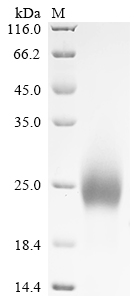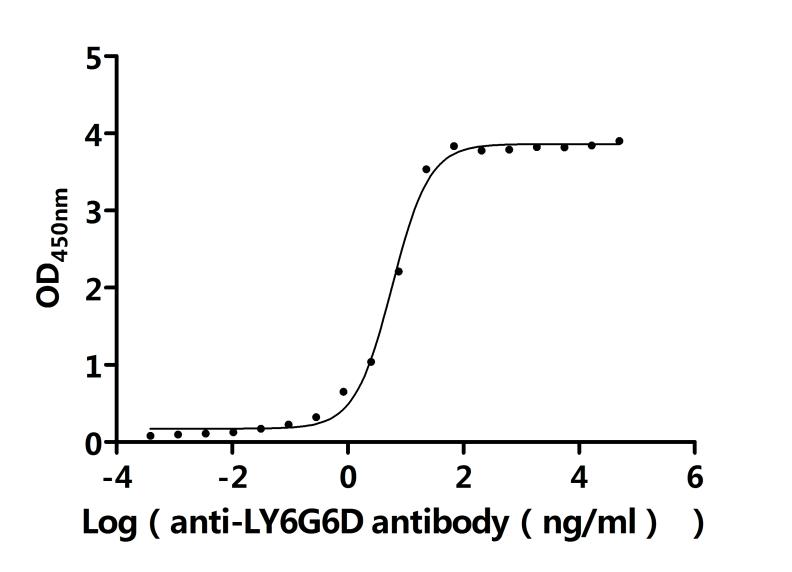The recombinant mouse Ly6G6D protein is an active, high-purity molecule prepared in a yeast system, designed to preserve its functional conformation. It consists of amino acids 20 to 108 of the native Ly6G6D and is engineered with an N-terminal 6xHis tag for simplified purification and detection. Available in liquid or lyophilized form, this recombinant Ly6G6D protein demonstrates greater than 95% purity as confirmed by SDS-PAGE. Its biological activity is verified by a functional ELISA, where Ly6G6D immobilized at 2 μg/mL binds specifically to the anti-Ly6G6D recombinant antibody (CSB-RA013246MA4MO), with an EC50 between 5.260 and 6.497 ng/mL. These features make it a reliable reagent for immunological studies, antibody validation, and investigations into Ly6 family protein function.
Ly6G6D is a GPI-anchored protein that plays a significant role in the immunological landscape of colorectal cancer (CRC). Research has established Ly6G6D as a promising antigen, particularly associated with mismatch repair proficient (MSS) colorectal cancer, where it exhibits selective expression linked to tumor progression and immune responses.
Studies have shown that Ly6G6D specifically contributes to immune evasion strategies in CRC. This protein is predominantly expressed in the MSS subtype of colorectal cancer and is involved in the activation of immune suppressive pathways, as demonstrated by its up-regulation in tumors characterized by an infiltration of regulatory T-cells (Tregs) and a limited expression of immune checkpoint molecules like PD-1 and PD-L1 [1][2]. The expression levels of Ly6G6D in tumors may serve as indicators of the tumor microenvironment's immunological characteristics and potentially its response to therapies [3].
Clinical studies suggest that Ly6G6D can be utilized as a biomarker for therapeutic targeting in CRC, particularly for enhancing T-cell responses against tumors that are otherwise less responsive to conventional immunotherapies. The expression of Ly6G6D has been shown to correlate with poor prognosis and low response rates to immune checkpoint inhibitors, making it a suitable candidate for targeted immunotherapeutic strategies [4][5]. Current investigations are exploring the effectiveness of bispecific antibodies targeting Ly6G6D to stimulate T-cell-mediated anti-tumor immunity, especially in patients presenting with MSS CRC, where the traditional response to immune therapies is notably inadequate [6][7].
Moreover, variations in epigenetic modifications related to Ly6G6D have been implicated in CRC tumorigenesis. Methylation patterns at the Ly6G6D locus can influence its expression, thereby affecting T-cell interaction and subsequent immune responses [8]. Tumors with high Ly6G6D expression may indicate suppressed anti-tumor immune activity, further supporting its role as a significant player in CRC progression and immune modulation [9].
References:
[1] G. Giordano, P. Parcesepe, et al. Jak/stat5-mediated subtype-specific lymphocyte antigen 6 complex, locus g6d (ly6g6d) expression drives mismatch repair proficient colorectal cancer. Journal of Experimental & Clinical Cancer Research, vol. 38, no. 1, 2019. https://doi.org/10.1186/s13046-018-1019-5
[2] H. Liu, S. Chen, et al. Spatially resolved transcriptomics revealed local invasion-related genes in colorectal cancer. Frontiers in Oncology, vol. 13, 2023. https://doi.org/10.3389/fonc.2023.1089090
[3] A. García, M. Pedregal, et al. Clinical and immunologic characteristics of colorectal cancer tumors expressing ly6g6d. International Journal of Molecular Sciences, vol. 25, no. 10, p. 5345, 2024. https://doi.org/10.3390/ijms25105345
[4] L. Corrales, S. Hipp, et al. Ly6g6d is a selectively expressed colorectal cancer antigen that can be used for targeting a therapeutic t-cell response by a t-cell engager. Frontiers in Immunology, vol. 13, 2022. https://doi.org/10.3389/fimmu.2022.1008764
[5] P. Wang, L. Sun, et al. Novel anti-ly6g6d/cd3 t-cell–dependent bispecific antibody for the treatment of colorectal cancer. Molecular Cancer Therapeutics, vol. 21, no. 6, p. 974-985, 2022. https://doi.org/10.1158/1535-7163.mct-21-0599
[6] S. Amniouel and M. Jafri. High-accuracy prediction of colorectal cancer chemotherapy efficacy using machine learning applied to gene expression data. Frontiers in Physiology, vol. 14, 2024. https://doi.org/10.3389/fphys.2023.1272206
[7] F. Caruso, M. D’Andrea, et al. Ly6g6d is epigenetically activated in classical colorectal adenocarcinoma and hyper-methylated in mucinous subtypes determining resistance to folfox therapeutic regimens.., 2021. https://doi.org/10.21203/rs.3.rs-783534/v1
[8] F. Caruso, M. D’Andrea, et al. Lymphocyte antigen 6g6d-mediated modulation through p38α mapk and dna methylation in colorectal cancer. Cancer Cell International, vol. 22, no. 1, 2022. https://doi.org/10.1186/s12935-022-02672-1
[9] R. Luo, H. Li, et al. Shengqiyichang decoction regulates antitumor immunity in colorectal cancer by downregulating lymphocyte antigen 6 family member g6d via the protein kinase b/p38 mitogen-activated protein kinase signaling pathway. Heliyon, vol. 10, no. 21, p. e39071, 2024. https://doi.org/10.1016/j.heliyon.2024.e39071








